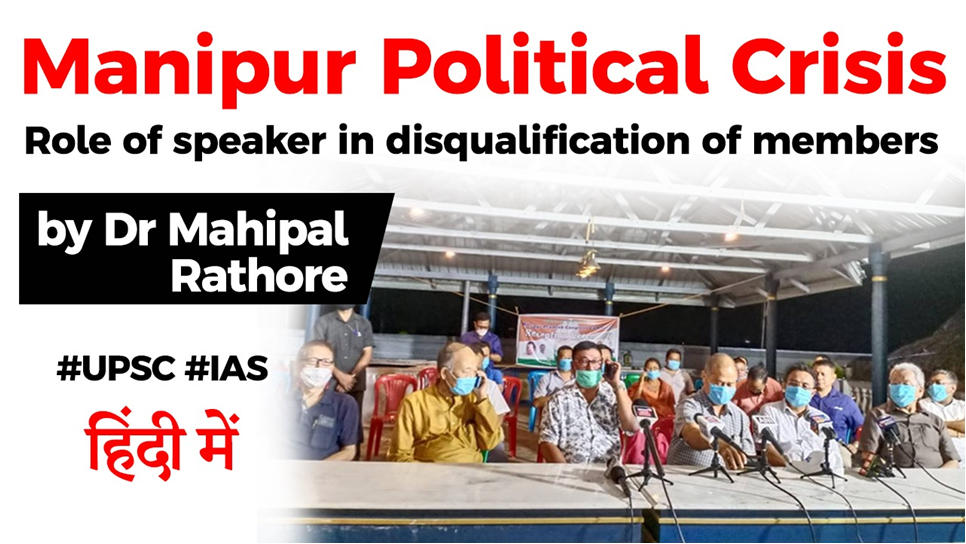Table of Contents
Importance of the issue
- Question on Anti defection Law In Prelims
- Analysis / example in Mains GS2 Paper.

Manipur Legislative Assembly Elections 2017

- On 15 March 2017, Biren Singhof BJP was sworn as the Chief Minister
- Bjp formed a coalition with
- National People’s Party
- Naga People’s Front
- Lok Janshakti Party
- Trinamool Congress
- Independent
The Revolving door politics
- Later, 8 Congress MLAs joined BJP, taking the government’s tally to 40 members.
- CM N.Biren Singh himself had joined BJP just before the 2017 elections
- Joykumar of NPP

- March – One Congress MLA, who had defected to the BJP, was disqualified by the Speaker following an order of the Supreme Court, reducing the house strength to 59 members.
- June 8 – High Court of Manipur restrained the seven Congress MLAs, who defected to the BJP, from entering the assembly till Speaker Y. Khemchand Singh finally disposed of the pending anti-defection cases against them.
What happened in June 2020?
- Right before the Rajya sabha elections , on 17 June, many MLAs switched support from the BJP govt.
- 4 NPP
- 1 TMC
- 1 independent
- 3 BJP MLAs tendered resignation from the House and joined Congress
- 4 out of 7 who had left Congress, went back to Congress again.
- House strength – 56
- Congress + = 30
- Okram Ibobi singh staked claim to form a govt.
The Speaker’s Decision
- Just before the elections, the Speaker :-
- disqualified the 4 BJP (Congress*) MLAs who had returned to Congress.
- While allowing the other three, still with BJP, to vote in the Rajya Sabha election.
- His decision brought down the Congress tally to 26, at par with BJP, in a house now reduced to 52 members
RS election
- BJP candidate Leishemba Sanajaoba won the Rajya Sabha election getting 28 votes while his Congress rival got 24
- 2 Congress votes – ???


Anti Defection Law
- 10th Schedule of the Constitution , added via the 52nd Amendment Act, 1985.
- An elected member of the house shall be disqualified from being a member if they win the election as a candidate of one party and then join another.
- The power for this disqualification is vested in the Speaker, who is usually a nominee of the ruling party.
- Grounds for disqualification
- If an elected member gives up his membership of a political party voluntarily.
- If he votes or abstains from voting in the House, contrary to any direction issued by his political party.
- If any member who is independently elected joins any party.
- If any nominated member joins any political party after the end of 6 months.
The Speaker
- The decision on disqualification questions on the ground of defection is referred to the Speaker or the Chairman of the House, and his/her decision is final*.
- Originally, the Act provided that the presiding officer’s decision was final and could not be questioned in any court of law.
- In Kihoto Hollohan case (1993), the Supreme Court declared this provision as unconstitutional on the ground that it seeks to take away the jurisdiction of the SC and the high courts.
- Presiding officer should function as a tribunal
The Problem
- Time taken for speaker’s decision??
- Whether a High Court can direct a Speaker to decide a disqualification petition within a certain timeframe is pending before a Constitution Bench of the Supreme Court.
(2016 SA Sampath Kumar vs Kale Yadaiah ) - January 2020 – Speakers of assemblies and the Parliament must decide disqualification pleas within a period of three months except in extraordinary circumstances.
Latest Burning Issues | Free PDF






















 WhatsApp
WhatsApp